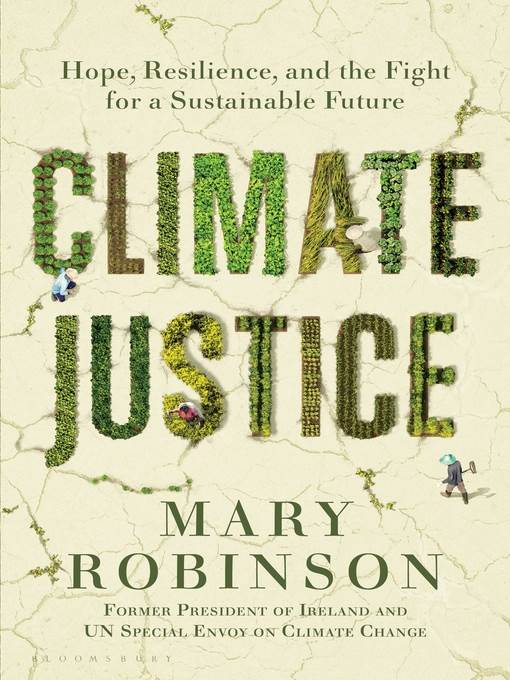
Climate Justice
Hope, Resilience, and the Fight for a Sustainable Future
- اطلاعات
- نقد و بررسی
- دیدگاه کاربران
نقد و بررسی

July 16, 2018
Robinson (Everybody Matters: My Life Giving Voice), a former president of Ireland and United Nations High Commissioner for Human Rights, writes of global warming and climate justice in this succinct but powerful volume. She highlights communities “suffering the worst effects of climate change” that, more often than not, are “least responsible for the emissions causing change.” Robinson describes, for example, drought-stricken farmers in Uganda, who have endured extreme weather in recent years (longer rainy seasons followed by intense periods of drought) that has damaged maize, sorghum, and millet crops; weighed produce down with moisture and pests; and crippled yields. She recalls the havoc wreaked along the Gulf Coast in 2005 by Hurricane Katrina—more than 1,800 deaths and more than one million homes and businesses destroyed—which “weighed more heavily upon racial minorities and the poor.” She bemoans the Trump administration’s “unconscionable” decision to pull the United States out of the 2015 Paris Agreement, an accord “negotiated by more than 190 world leaders, over decades, in the interests of all people and the planet.” She remains hopeful, however, that humans will heed “personal responsibility for our families, our communities, and our ecosystems.” This brief but cogent account reminds readers that climate change is not academic or abstract; it is real and it has consequences.

Starred review from August 1, 2018
As the UN secretary-general's special envoy on climate change, Robinson has traveled the world seeking evidence of how communities are reacting to extreme weather conditions. The author's earlier work on human rights campaigns convinced her that climate change is more than just an environmental issue. In this work, she shows how economic, political, and civil rights are directly connected to access to food, water, and healthy living conditions. Climate justice is the idea that we must intervene to halt the suffering of the most vulnerable populations caused by the actions of wealthy nations and corporations. Robinson reveals the stories of individuals who have faced devastating floods, drought, and pollution and who are organizing to bring change locally and globally. A farmer in Uganda, a small business owner in Mississippi, and a coal miner in Canada share a vision that there is hope for their communities. VERDICT Robinson puts a human face on this politically charged issue, adding to the climate change conversation. Highly recommended.--Catherine Lantz, Univ. of Illinois at Chicago Lib.
Copyright 2018 Library Journal, LLC Used with permission.

August 15, 2018
The former head of the United Nations Commission for Human Rights details the human rights dimension of climate change, showing how neglect by the powerful is already affecting the underprivileged around the globe.Previously the first female president of Ireland, Robinson (Everybody Matters: My Life Giving Voice, 2013) had become increasingly involved with climate change and its human toll when her editor for her American publisher told her, "I would love for you to write a storytelling book about climate justice." This is that book, a narrative of unlikely activists, mostly women, whose communities have experienced firsthand the devastating effects of global warming and have become proactive. The subtext here is giving voice to the previously voiceless, providing seats at the table not only for the powerful who are proceeding heedlessly, but for those who have been suffering devastating consequences: economic upheaval, starvation, and destruction inflicted by the policies of powerful countries on the other side of the globe. "In eastern Uganda there are no seasons anymore," explains a farmer in that country. "Agriculture is a gamble....It was not until I went to a meeting about climate change that I heard it was not God but the rich people in the West who are doing this to us." The book both begins and ends with Donald Trump's decision to pull the United States out of the Paris Agreement, which had been negotiated after decades of attempts and failures to reach accord. "It is unconscionable," writes the author, "that the United States has simply walked away from its responsibility to people both at home and abroad, in the interest of short-term fossil fuel profits." Nonetheless, Robinson's tone throughout is hopeful and optimistic, as one story after another finds accidental activists, primarily women, changing their own lives as well as those of their communities, accepting both the challenge and the responsibility of confronting the threat.In a measured tone that is largely free of politicized rhetoric, the author tells engaging stories of extraordinary accomplishments by ordinary people.
COPYRIGHT(2018) Kirkus Reviews, ALL RIGHTS RESERVED.




دیدگاه کاربران